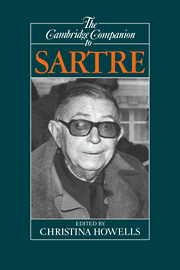Book contents
- Frontmatter
- Introduction
- Part I Phenomenology and existentialism
- Part II Psychology and ethics
- Part III History and structure
- 7 Sartre and the poetics of history
- 8 Sartre on progress
- 9 Sartrean Structuralism?
- Conclusion: Sartre and the deconstruction of the subject
- Appendix; Hegel and Sartre
- Bibliography
- Index
7 - Sartre and the poetics of history
from Part III - History and structure
Published online by Cambridge University Press: 28 May 2006
- Frontmatter
- Introduction
- Part I Phenomenology and existentialism
- Part II Psychology and ethics
- Part III History and structure
- 7 Sartre and the poetics of history
- 8 Sartre on progress
- 9 Sartrean Structuralism?
- Conclusion: Sartre and the deconstruction of the subject
- Appendix; Hegel and Sartre
- Bibliography
- Index
Summary
The purpose of this essay is to reflect on Sartre as a philosopher of the imagination in order better to describe and assess his approach to the philosophy of history. Sartre was, of course, an existentialist and we shall consider what it means to formulate an “existentialist” philosophy of history. But his was equally a philosophy of consciousness and the paradigm of consciousness for him was imaginative consciousness. Realizing this fact will open the door to a more adequate comprehension of his work as a whole, but especially his social thought, including his theory of history. For a basic thesis I wish to defend is that Sartre likens the intelligibility of history to that of an artwork because he considers the former as much the product of creative freedom as he does the latter. So we shall begin with a reading of major theses from his Psychology of Imagination and move through his posthumously published works, The War Diaries and the Cahiers pour une morale, in order to observe their expansion and application in both volumes of the Critique of Dialectical Reason and The Family Idiot. In so doing, we shall try to make sense of Sartre's claim that history in general and his Flaubert study in particular constitute “a novel that is true” (un roman vrai).
- Type
- Chapter
- Information
- The Cambridge Companion to Sartre , pp. 213 - 260Publisher: Cambridge University PressPrint publication year: 1992
- 3
- Cited by

